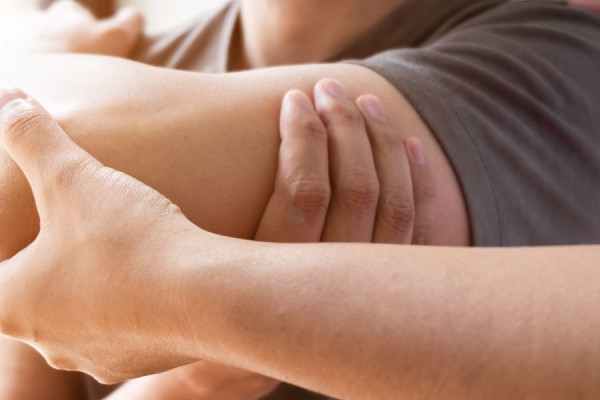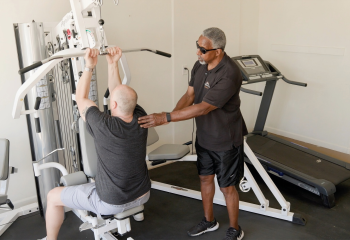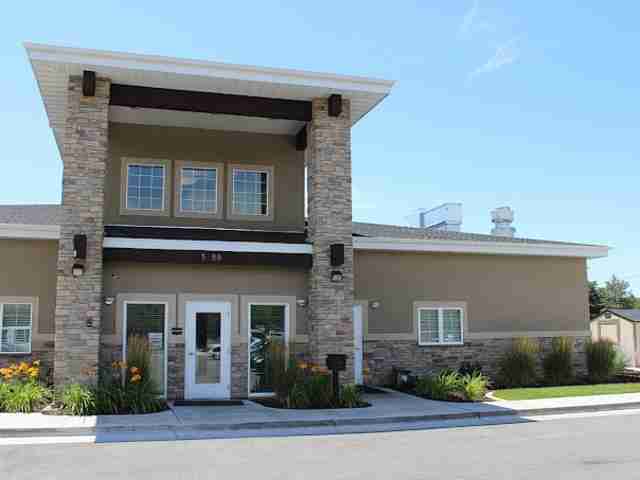More About Treatment Centers with a Physical Therapy Center
Integrating physical therapy into your treatment plan can ease pain and discomfort. Addiction to drugs and alcohol can result in poor health and leave you needing additional physical support. In rehab, traditional therapies usually aim to address the psychological and emotional aspects of your addiction or mental health concern, however, some rehabs incorporate physical therapy to address more dimensions of your health.
Physical Health Problems Associated with Substance Use or Mental Health Disorders
If you’ve been using using substances or are under severe psychological distress, you may notice physical symptoms like:
- Muscle tension or pain: If you’re undergoing detox, withdrawal symptoms may include muscle tension, stiffness, or body aches.
- Balance and coordination problems: Long-term or active substance use can cause improper balance and coordination.
- Decreased mobility: Long-term substance use can cause inflammation, decreasing your range of motion.
- Chronic pain syndromes: Those with an addiction or mental health condition may experience chronic pain, like fibromyalgia or chronic back pain. Chronic pain can lead to substance use as a way to cope.
- Injuries: Substance use can increase risk for injuries sustained in accidents or from impaired judgment.
Physical therapy can help with any of these conditions and improve your overall recovery by addressing your physical health.
Types of Physical Therapy and Their Use in Rehab
The physical therapy umbrella encompasses several physical modalities: traditional physical therapy, exercise therapies, manual therapies and alternative medicine treatments. Here’s how they can benefit people in treatment:
- Exercise Therapy: Physical fitness programs can improve cardiovascular health, strength and flexibility. Exercise options at rehab may include aerobic exercises, strength training, yoga, and pilates.
- Manual Therapy: Techniques like myofascial release (massaging contracted muscles and improving elasticity) and massage therapy can help alleviate muscle tension and reduce pain.
- Balance and Coordination Support: This type of training can improve stability, body awareness and motor control.
- Functional Physical Therapy: This form of physical therapy focuses on restoring daily physical functions, like walking, climbing stairs, lifting weights, and carrying objects.
If you feel your individual treatment plan should include physical therapy, look for a treatment center that provides comprehensive treatment by implementing physical therapy into their care.
Risks Associated with Physical Therapy
While physical therapy overseen by a doctor of physical therapy is generally considered a safe and effective way to improve physical health, it can have risks, like:
- Exacerbated symptoms: While this is rare, certain exercises or manual therapies can exacerbate symptoms.
- Injury or stress: Improper form can lead to injuries. It’s important to work with physical therapists that provide proper instruction and feedback to prevent injury.
- Cardiovascular stress: Strenuous exercises can cause cardiovascular stress in those with heart conditions or risk factors. Make sure the treatment center you choose accounts for co-occurring conditions and modifies treatment if needed.
- Psychological stress: Physically challenging exercises can sometimes cause additional stress or anxiety, especially for patients who have pre-existing mental health conditions.
In order to prevent these risks, it’s vital to ensure the rehab center you choose conducts thorough physical assessments and tailors treatment plans to your unique needs. A good physical therapist will monitor your progress and success. Open communication is essential to address any concerns or express satisfaction with progress made.
Benefits of Physical Therapy for Substance Use or Mental Health Disorders
The benefits of physical therapy include:
- Stress reduction: Physical activity and exercise can release endorphins and neurotransmitters that create feelings of wellbeing. This can benefit patients with mental health concerns or struggle with substance cravings.
- Self-esteem and confidence: Physical therapy can help you feel strong, able to overcome challenges, and stay motivated in recovery.
- New coping mechanisms: Physical fitness can distract you from negative thoughts and allow you to channel your energy into something positive and productive.






























































